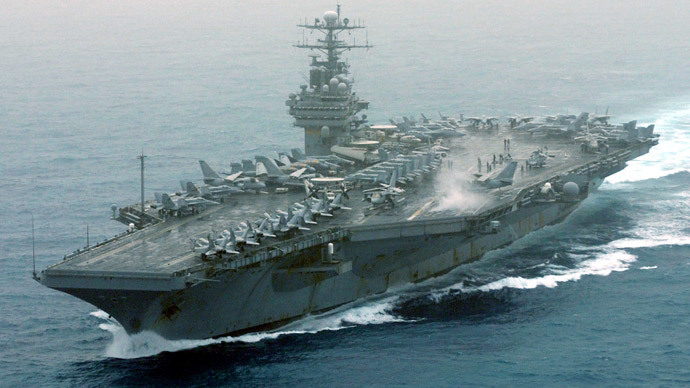Monster US warship anchors off Portsmouth, defense chiefs downplay British shrinkage

At more than 100,000 tons, laden with warplanes and missiles and with 5,000 men and women aboard, the American Nimitz Class aircraft carrier USS Theodore Roosevelt anchored at Portsmouth has British defense chiefs talking down military cuts.
The Roosevelt – known to her crew as Big Stick – is currently moored off Portsmouth because she is simply too big to dock in the port.
Serving alongside the thousands of US sailors and marines, as part of an exchange program, are six aircraft handlers and a navigator from the Royal Navy.
In a statement on the Ministry of Defence (MoD) website, Britain's First Sea Lord, Admiral Sir George Zambrellas, lauded the US-UK defense relationship.
“It is excellent to see US Navy carrier steel in Portsmouth.
“And in barely two years we will see UK carrier steel here too,” he said, referring to the UK's two carriers, HMS Queen Elisabeth and the planned HMS Prince of Wales
READ MORE: ‘Very concerned’: Top US general attacks UK military spending cuts
“We warmly welcome the Theodore Roosevelt Carrier Strike Group – a reflection of the close partnership between our nations and navies, and the value of credible sea power in support of our shared national interests.”
The carrier is in the UK for five days, having made the initial transatlantic leg of her round-the-world operational mission to project US military power around the globe.
But the arrival of so potent a symbol of American might comes at a time when civilian and military defense chiefs on both sides of the Atlantic are airing their concerns over Britain's willingness and capacity to commit to the symbolic NATO contribution of 2 percent of gross domestic product (GDP).
British Defense Secretary Michael Fallon downplayed fears.
“The USS Theodore Roosevelt’s visit shows yet again that UK/US relations are as close as ever. Ten days ago, I was the first of his counterparts to meet incoming Defence Secretary Ash Carter.
READ MORE: NATO will be harmed by UK defense cuts, Obama tells Cameron
“Having the Roosevelt in Portsmouth today is yet another example of the world’s broadest, deepest and most enduring defense relationship at work. I’m thrilled to be going aboard today to welcome the crew personally.”
Yet behind this Atlanticist ardor, a narrative of fear over defense cuts has come to dominate in recent months.
Writing in the Telegraph on Monday, Fallon sketched out the broad range of threats he believes Britain confronts.
“In Eastern Europe, Russia is subverting democracy – seeking to change international borders by force and destabilizing a sovereign state,” wrote Fallon.
“In the Middle East, the ISIL (Islamic State) death cult is spreading a new form of fascism in its warped drive to create a caliphate spanning Syria and Iraq. And in Africa, another jihadist franchise, Boko Haram, is causing chaos in northern Nigeria and along its borders.”
READ MORE: £5bn black hole in UK defense budget poses ‘real risks,’ say MPs
Yet he downplayed concerns about impending strategic impotence, and to some extent buttressed the view on defense taken by Prime Minister David Cameron, writing: “Our Armed Forces now rest on firm financial foundations.
“National security is underpinned by economic security, which is why we have gone from a £38-billion black hole in the defense budget left by Labour, to a properly funded £34-billion-a-year budget. After taking some tough decisions, we still have the largest defense budget in the EU and the second largest in NATO.”
“We are one of only four NATO countries meeting the target to spend 2 percent of our GDP on defense and we will do so this year and next.”
In early March, US Army Chief of Staff General Raymond Odierno said he was “very concerned” about military austerity given the deeply “uncertain global environment.”
READ MORE: ‘Hubris, cowardice, delusion’: MP blasts generals & politicians in defense debate
“We have a bilateral agreement between our two countries to work together. It is about having a partner that has very close values and the same goals as we do,” explained Odierno at the New America Foundation’s ‘Future of War’ conference.
“What has changed, though, is the level of capability. In the past we would have a British Army division working alongside an American army division,” he added. Cuts mean the US Army now expects Britain to provide only half its previous commitment.
Despite fears of British military decline – many of which were expressed in a much-hyped but poorly attended Commons debate on defense reductions two week ago – UK defense spending remains the sixth highest in the world.












